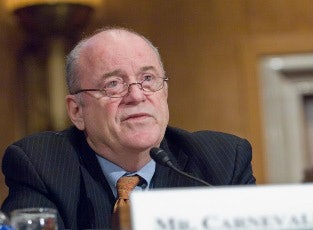 Anthony Carnevale says that the CEW study breaks new ground by its use of online employment ads in its research methodology.
Anthony Carnevale says that the CEW study breaks new ground by its use of online employment ads in its research methodology.
In “State Online College Job Market: Ranking the States”, researchers with Georgetown’s Center on Education and the Workforce (CEW) analyzed state labor markets and ranked the 50 states by the frequency of job openings per college-educated worker across a wide array of industries and career fields. The study also documents the fastest-growing careers and industries, and the firms that recruit the heaviest in each state.
“We estimate that between 60 and 70 percent of job openings are now advertised online, and the online job market continues to grow each year. Nearly 4 million unique job advertisements are posted online each quarter,” according to the study, which utilized data from the Burning Glass Technologies firm.
Dr. Tamara Jayasundera, the study’s co-author, explained that by combining online job ad information with traditional employment data she and lead author Anthony Carnevale developed a comprehensive “picture of job opportunities available to college graduates” in U.S. states.
The study finds that new economy jobs are particularly prevalent for college graduates across the 50 states, with employers in information services, consulting and business services, and financial services sectors posting the most online job ads per college-educated worker.
“The study focuses on the distribution of college [required] jobs — where they are — [and] the intensity of college [required] jobs,” which measures their availability, said Carnevale, the Center on Education and the Workforce director and research professor.
The insightful “thing that comes through when you look at the occupations and industries where the jobs are located is that the state economies are quite different … [and] that there are a number of states that [can be] called new economy states,” he said.
“If you have a college degree and you want to make a guess about where you should go, your best shot is to get a job in Massachusetts. … In places like West Virginia and a lot of the Southern states, there are many fewer college [required] job openings per college-educated person,” he noted.
Carnevale explained that the CEW study breaks new ground by its use of online employment ads in its research methodology. “The significance is that for bachelor’s degrees and graduate degrees [the online ads provide] pretty good data. That is, it catches about 80 percent of the job openings [for college graduates] on any given day,” he said.
In comparison, using online ads to study the job market for people without college degrees leads to statistically weaker analysis. “I don’t think we’ll get to the point that the sub-baccalaureate jobs will hit more than 50 percent of those [available positions being posted online]. A lot of sub-baccalaureate jobs are advertised by word of mouth, construction jobs in particular,” Carnevale said.
Among other study findings:
•In Massachusetts, 63 percent of job openings are for college graduates, while in West Virginia, only 36 percent of job openings are for college graduates.
•College graduates have the best odds of finding managerial and professional jobs in Massachusetts, Delaware and Washington states; they find greatest challenges in West Virginia, Mississippi and South Carolina.
•College graduates seeking work in the consulting and business services sector should consider Delaware, Ohio and Massachusetts; and avoid Rhode Island, New Mexico and New Hampshire.
• College graduates seeking work in science, technology, engineering, and mathematics (STEM) careers have the best odds in Delaware, Massachusetts and New York.
“State Online College Job Market: Ranking the States” can be accessed at https://cew.georgetown.edu/report/rankingthestates/ for the full report and executive summary.















